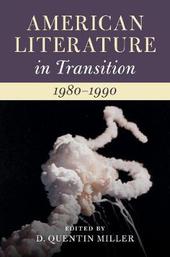
|
American Literature in Transition, 1980-1990
Hardback
Main Details
| Title |
American Literature in Transition, 1980-1990
|
| Authors and Contributors |
Edited by D. Quentin Miller
|
| Series | American Literature in Transition |
|---|
| Physical Properties |
| Format:Hardback | | Pages:346 | | Dimensions(mm): Height 236,Width 160 |
|
| Category/Genre | Literary studies - from c 1900 - |
|---|
| ISBN/Barcode |
9781108415606
|
| Classifications | Dewey:820.900914 |
|---|
| Audience | | Professional & Vocational | |
|---|
| Illustrations |
Worked examples or Exercises
|
|
Publishing Details |
| Publisher |
Cambridge University Press
|
| Imprint |
Cambridge University Press
|
| Publication Date |
28 December 2017 |
| Publication Country |
United Kingdom
|
Description
History has not been kind to the 1980s. The decade is often associated with absurd fashion choices, neo-Conservatism in the Reagan/Bush years, the AIDS crisis, Wall Street ethics, and uninspired television, film, and music. Yet the literature of the 1980s is undeniably rich and lasting. American Literature in Transition, 1980-1990 seeks to frame some of the decade's greatest achievements such as Toni Morrison's monumental novel Beloved and to consider some of the trends that began in the 1980s and developed thereafter, including the origins of the graphic novel, prison literature, and the opening of multiculturalism vis-a-vis the 'canon wars'. This volume argues not only for the importance of 1980s American literature, but also for its centrality in understanding trends and trajectories in all contemporary literature against the broader background of culture. This volume serves as both an introduction and a deep consideration of the literary culture of our most maligned decade.
Author Biography
D. Quentin Miller is the author, editor, or co-editor of ten books, most recently The Routledge Introduction to African American Literature (2016), 'A Criminal Power': James Baldwin and the Law (2012), and Prose and Cons: Essays on Prison Literature in the United States (2005). Forthcoming books include Understanding John Edgar Wideman and James Baldwin in Context. He has also published more than two dozen articles or chapters on contemporary literature. Moreover, he is a fiction writer and plans to write a memoir / intellectual history of the 1980s as a companion to this volume.
|